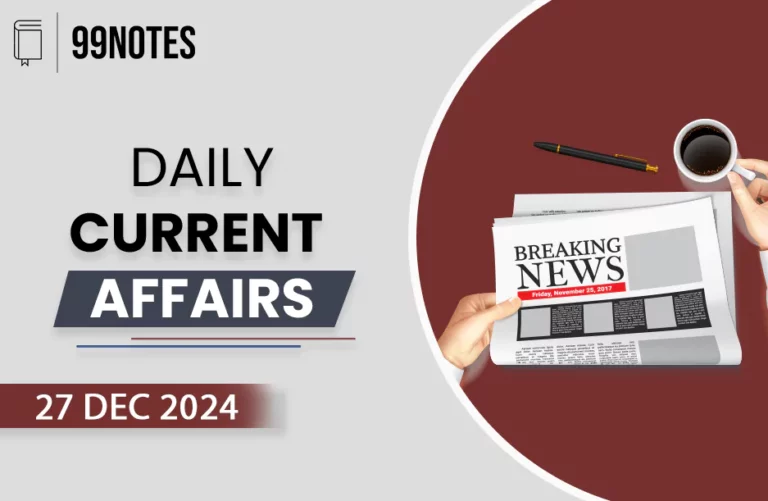4 July 2023 : Daily Current Affairs
DAILY CURRENT AFFAIRS
4-July-2023
Daily Current Affairs For UPSC ,Daily Current affairs of The hIndu and Indian Express.
1. PM to host Xi, Putin, Sharif virtually for SCO summit.
Topic: GS2 – International relations.
Context:
- Prime Minister Narendra Modi will virtually host the Shanghai Cooperation Organisation’s Council of Heads of State (SCO-CHS) meeting.
More about the news:
- The meeting will be attended by Russian President Vladimir Putin, Chinese President Xi Jinping, Pakistan Prime Minister Shehbaz Sharif, and Central Asian Presidents.
- The summit will adopt four outcomes, including the “New Delhi Declaration” and two joint statements on countering radicalism and digital transformation.
- An agreement on economic cooperation initiatives is being negotiated, but it is uncertain whether all countries, especially India, will sign it due to past differences over the Belt and Road Initiative.
- The virtual summit replaces the originally planned in-person summit in Delhi and will consist of a single session via videoconferencing.
About Shanghai Cooperation Organisation:
The Shanghai Cooperation Organisation (SCO) is a regional intergovernmental organization founded in 2001. It was established by six member countries: China, Russia, Kazakhstan, Kyrgyzstan, Tajikistan, and Uzbekistan. The organization aims to promote cooperation and maintain stability in the region, particularly in the areas of security, economy, and cultural exchange.
Key points about the Shanghai Cooperation Organisation:
- Objectives: The SCO seeks to enhance regional security by addressing common threats such as terrorism, extremism, and separatism. It also aims to promote economic cooperation, cultural exchanges, and mutual trust among member states.
- Membership: The organization initially had six founding members. Over the years, it has expanded to include additional countries. India and Pakistan joined as full members in 2017, increasing the total number of member states to eight.
- Decision-making: The SCO operates on the principle of consensus among member states. Major decisions are made through consultations and joint agreements. The Council of Heads of State and the Council of Heads of Government are the highest decision-making bodies within the organization.
- Regional security cooperation: The SCO conducts joint military exercises, counter-terrorism drills, and intelligence sharing among member states to address security challenges. It also focuses on border security and countering drug trafficking.
- Economic cooperation: The SCO promotes trade, investment, and economic integration among member countries. It aims to enhance connectivity through infrastructure projects, transport networks, and energy cooperation. The SCO also facilitates cooperation in areas such as agriculture, technology, and
- Dialogue partners and observers: The SCO maintains relationships with various countries and international organizations through dialogue partnerships and observer status. These entities engage in discussions and cooperation with the SCO but do not have full membership rights.
- Regional initiatives: The SCO has launched several initiatives, including the Regional Anti-Terrorist Structure (RATS), the SCO Business Council, the Interbank Consortium, and the SCO Development Bank. These initiatives support cooperation in specific areas and contribute to the organization’s objectives.
Source: The Hindu, July 4, 2023, page 1
2. J&K govt. approves plan for allotment of land to the landless
Topic: GS3 – Land reforms
Context:
- The Jammu and Kashmir Lieutenant Governor’s administration has approved the allotment of five marlas (.031 acre) of land each to the landless population in the Union Territory under the Pradhan Mantri Awas Yojana-Gramin (PMAY-G) scheme.
Why in the news?
- This decision is seen as a historic step towards social justice and equality.
- The land will be given to landless individuals and those occupying State or forest land where construction is not permitted.
- Initially, the allotment is restricted to the left-out cases from the Permanent Waiting List of 2018-19, but it may be extended to eligible beneficiaries in future phases of the PMAY-G scheme.
- The Ministry of Rural Development has also allocated an additional target of 1,99,550 houses to the Union Territory for the financial year 2023-24 for the saturation of the Awaas plus list.
Source: The Hindu, July 4, 2023, page 4
3. Tamil Nadu flags shortage in its share of Cauvery water
Topic: GS2 – Interstate water dispute
Context:
- The Tamil Nadu government has raised concerns over the deficit in its share of water from Karnataka and has written to the Cauvery Water Management Authority (CWMA) seeking directions for Karnataka to release Tamil Nadu’s actual share for July.
Tamil Nadu’s stand:
- The Water Resources Department Secretary of Tamil Nadu sent the letter to the CWMA, expressing concern over Karnataka’s actions and reiterating Tamil Nadu’s opposition to the construction of a dam at Mekedatu.
- The Tamil Nadu government has vowed to protect the state’s rights and ensure uninterrupted water supply for agriculture.
- The issue of the deficit in Tamil Nadu’s share was also raised during a meeting of the Cauvery Water Regulation Committee.
- Tamil Nadu’s Water Resources Minister criticized the meeting between Karnataka’s Deputy Chief Minister and the Union Minister for Jal Shakti regarding the Mekedatu proposal, stating that it goes against the Supreme Court’s judgment.
More about Cauvery river dispute:
- The Cauvery river dispute is a long-standing conflict between Tamil Nadu, Kerala, Puducherry and Karnataka over sharing the waters of the Cauvery River.
- It involves disagreements on water distribution, historical rights, and implementation of tribunal awards, with attempts to find a resolution ongoing through negotiations and legal interventions.
- In 1990, the central government constituted the Cauvery Water Disputes Tribunal (CWDT) to adjudicate on the matter. The tribunal issued its final award in 2007, which allocated a specific quantum of water to each state.
- However, implementation of the tribunal’s award has been a challenge, leading to further tensions and disputes. Both states have accused each other of non-compliance with the tribunal’s orders, resulting in protests, agitations, and sporadic violence.
- The Cauvery river dispute has also had significant political implications, with political parties in both states using the issue to mobilize support. The dispute has often escalated during drought years when water scarcity becomes acute.
- Efforts are still ongoing to find a lasting solution to the dispute. Mediation by the central government and the involvement of various stakeholders, including farmers’ associations, have been part of the process. However, finding a mutually acceptable resolution that addresses the concerns of both states continues to be a complex task.
Source: The Hindu, July 4, 2023, page 4
4. Greedflation and its counter arguments: how consumers ultimately decide prices
Topic: GS3 – Economy
What is Greedflation how it impacts economy:
- Greedflation refers to price inflation caused by corporate greed for high profits.
- Proponent of the greedflation theory argue that corporate profit margins have risen significantly since the pandemic, contributing to high inflation.
- They suggest that U.S. corporations have increased prices more than necessary to compensate for higher input costs caused by supply-chain bottlenecks.
- Critics argue that businesses cannot arbitrarily set prices; prices are determined by what consumers are willing to pay.
- Inflation refers to a general rise in the price level across the economy, not just individual goods and services.
Source: The Hindu, July 4, 2023, page 8
5. Was India’s hot summer of 2023 a portend of things to come?
Topic: GS3 – Climate change
India experiencing climate change:
- India has been experiencing more instances of severe heatwaves, indicating a changing climate.
- Climate change is increasing the frequency and intensity of extreme weather events, leading to changes in monsoon patterns, increased rainfall variability, and prolonged rain-free periods.
- Rising temperatures and marine heatwaves in the Indian Ocean have a significant impact on monsoon winds and rainfall patterns.
- Amplification occurs when climate-related factors interact, intensifying overall risks and consequences of climate change.
- Multiple climatic and non-climatic risks, such as heatwaves, droughts, and ocean heatwaves, can compound risks across sectors and impact water availability, agriculture, and human systems.
- Proactive measures to mitigate greenhouse gas emissions, adapt to changing conditions, and enhance resilience are necessary to address amplified climate risks and build a sustainable future.
Source: The Hindu, July 4, 2023, page 18
6. DEEP SEA MINING
Syllabus – GS III
Recent Context – The International Seabed Authority – the United Nations body regulating the world’s ocean floor—is preparing to resume negotiations that could open the international seabed for mining, including materials critical for the green energy transition.
What is deep sea mining?
- Deep-sea mining involves removing mineral deposits and metals from the ocean’s seabed.
- There are three types of such mining:
- taking deposit-rich poly metallic nodules off the ocean floor,
- mining massive seafloor sulphide deposits,
- stripping cobalt crusts from rock.
- These nodules, deposits and crusts contain materials, such as nickel, rare earths, cobalt and more, that are needed for batteries, other materials used in tapping renewable energy, and everyday technology like cell phones and computers.
- Engineering and technology used for deep sea mining are still evolving.
How is it regulated?
- Countries manage their own maritime territory and exclusive economic zones. At the same time, the high seas and the international ocean floor are governed by the United Nations Convention on the Law of the Seas.
- It is considered to apply to states regardless of whether or not they have signed or ratified it.
What are the concerns?
- Only a small part of the deep seabed has been explored, and conservationists worry that mining will damage ecosystems, especially without any environmental protocols.
- Damage from mining can include noise, vibration and light pollution, and possible leaks and spills of fuels and other chemicals.
- Sediment plumes from some mining processes are a major concern. Once valuable materials are extracted, slurry sediment plumes are sometimes pumped back into the sea. That can harm marine life in several ways.
7. As the House panel meets on UCC, chief Sushil Modi questions feasibility in tribal areas.
Syllabus – GS II
Recent Context – The Law Commission’s decision to examine the issue afresh.
The Opposition MPs flagged the point that there are concerns regarding states’ legislative powers.
Issues
- The framing of the beginning is the biggest challenge.
- In a country as diverse as India, the UCC — the idea that there should be a common set of personal laws that govern marriage and divorce, inheritance and adoption across religious communities— is a thorny issue with social, political, legal and constitutional implications.
- Debates on its desirability and feasibility, in one form or another, go back to the birth of a new nation and even before that.
- UCC is different—because it touches all citizens and reaches deep inside their ways of life for generations and their personal spaces.
- The UCC does not affect Muslims alone. It affects the Hindu majority, as well as the various other minority communities and tribal groups.
UCC
- The Uniform Civil Code (UCC) calls for one law for India that applies to all religious communities in matters such as marriage, divorce, adoption, and inheritance
- The discussion starts back to British India when the British government submitted its report in 1835 stressing uniformity in the codification of Indian law relating to crimes, contracts, and evidence, specifically recommending that personal laws of Muslims and Hindus be kept outside such codification.
- The government formed the B N Rau Committee to codify Hindu law in 1941.
For Enquiry

4 July 2023 : Daily Current Affairs

3 July 2023 : Daily Quiz

3 July 2023 : Daily Current Affairs

3 July 2023 : Indian Express

1 July 2023 : Daily Quiz

1 July 2023 : The Hindu Editorial

1 July 2023 : Daily Current Affairs

1 July 2023 : Indian Express

30 June 2023 : Daily Quiz

30 June 2023 : Indian Express
Daily Current Affairs 4 July 2023 : Daily Current Affairs DAILY CURRENT AFFAIRS
4-July-2023
Daily Current Affairs For UPSC ,Daily Current affairs of The hIndu…
Daily Quiz 3 July 2023 : Daily Quiz 3 July 2023 : Daily Quiz…
Daily Current Affairs 3 July 2023 : Daily Current Affairs DAILY CURRENT AFFAIRS
3-July-2023
Daily Current Affairs For UPSC ,Daily Current affairs of The hIndu…
Indian Express 3 July 2023 : Indian Express Indian Express
3-July–2023
The Indian Express, CSE candidates can stay informed about current events…
Daily Quiz 1 July 2023 : Daily Quiz 1 July 2023 : Daily Quiz…
The Hindu 1 July 2023 : The Hindu Editorial The Hindu Editorial
1-July-2023
Daily Current Affairs For UPSC ,The Hindu Editorial Summary
Facebook-f
Twitter
Youtube
1.Governor…
Daily Current Affairs 1 July 2023 : Daily Current Affairs DAILY CURRENT AFFAIRS
1-July-2023
Daily Current Affairs For UPSC ,Daily Current affairs of The hIndu…
Indian Express 1 July 2023 : Indian Express Indian Express
1-July–2023
The Indian Express, CSE candidates can stay informed about current events…
Daily Quiz 30 June 2023 : Daily Quiz 30 June 2023 : Daily Quiz…
Indian Express 30 June 2023 : Indian Express Indian Express
30-June-2023
The Indian Express, CSE candidates can stay informed about current events…



